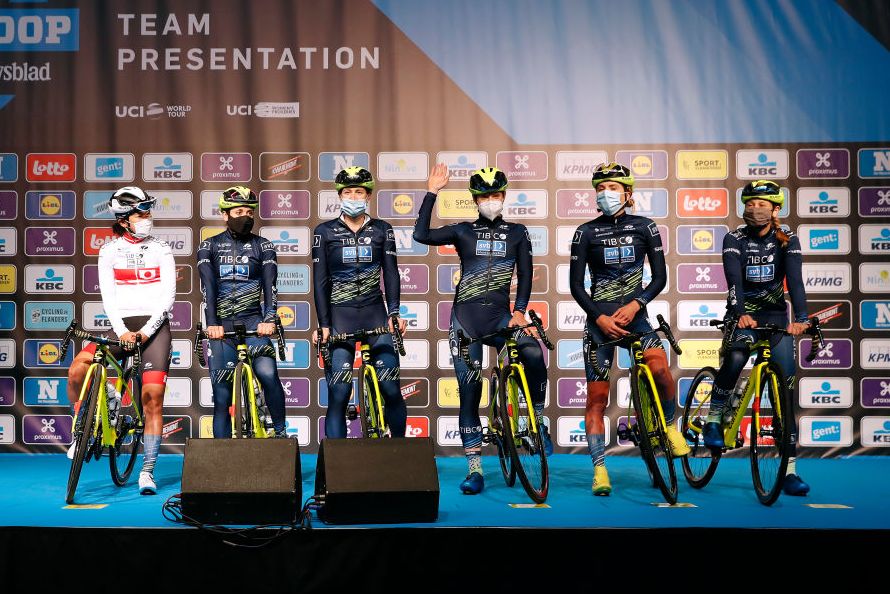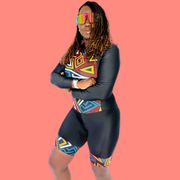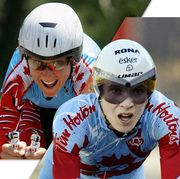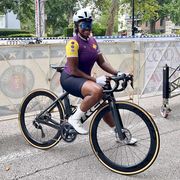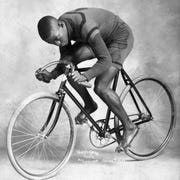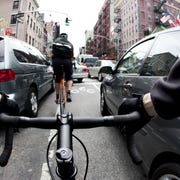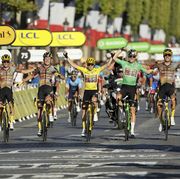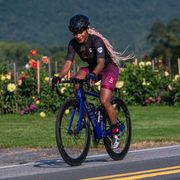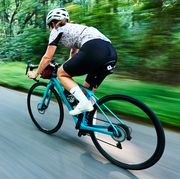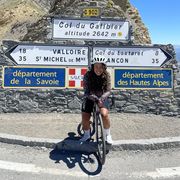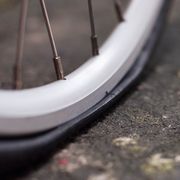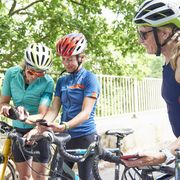- Name: Kristen Faulkner
- Age: 28
- Hometown: Homer, Alaska
- Team: Team TIBCO-Silicon Valley Bank
- Biggest Accomplishment: Third in the general classification at the Ladies Tour of Norway
Kristen Faulkner of Team TIBCO-Silicon Valley Bank has had a stellar year of racing as a professional cyclist. And it came as a bit of a surprise: While Faulkner assumed she’d spend a few years as a domestic pro, the universe had other plans.
The former venture capitalist caught the eye of TIBCO-SVB’s Linda Jackson (also a former banker) during a group ride early in her riding and racing career, and offered her a spot on the team. Faulkner left her job in finance and shifted to being a full-time professional cyclist, living and racing full-time in Europe. Though, she still loves the stock market and is passionate about closing the pay gap for women in cycling.
She’s also managed some stellar results in her first real season racing pro: The 28-year-old recently finished third in the General Classification at the Ladies Tour of Norway, with a Stage 1 win in a stacked field.
More From Bicycling

Join Bicycling All Access for more great cycling stories
Right now, Faulkner is in Andorra, training at altitude ahead of the world championships. In between living at 6,000 feet above sea level and doing intervals down at 2000 feet, Bicycling caught up with Faulkner to learn more about her transition to cycling full-time and her summer of success.
This interview has been edited for length and clarity.
Bicycling: Let’s start by going way back. How did you get into cycling?
Kristen Faulkner: I started cycling in New York City in 2017 for fun, then I joined a club team and pretty quickly moved up. I started racing right away in New York, then moved to California and kept racing. Through a group ride, I met Linda Jackson, and she invited me to coffee. She saw my results from racing in California, and invited me to join her team in 2020.
However the 2020 season didn’t really happen. I was home in Alaska working remotely, and I was really depressed because I was thinking how this was my debut year, but I hadn’t raced at all, so it doesn’t really count. I thought my career was completely over before it began. I remember, I was eating a bunch of cookies from my mom’s cookie jar—and they were not small cookies—just feeling bummed that I didn’t get my shot at racing.
And as I was eating these cookies, I got a call from my director who asked, “So, do you want to race Ardèche?” I dropped the cookie and the phone. I had 24 hours to get on a flight to Europe. Things moved fast.
You were working in finance, specifically venture capital, before going pro. When did you make the call to quit your day job and go all in on cycling?
I was working full time through the beginning of 2020, through the start of the pandemic. In September and October 2020, I went half-time in order to race in Europe. I didn’t expect to have that opportunity, but there were no races happening in the U.S., and I was shocked when the team asked me to get to Europe to race. As soon as I went back to the States at the end of October, I went back to work full-time. Then, on January 31, 2021, I just completely left. So I went from full-time work to full-time cycling. I felt really ready for that move.
Doing half-time while in Europe racing was just so hard. This was my first time with my teammates, and I was in my room on my computer all day because I had to be on California work hours. I missed almost every team dinner. I knew I couldn't continue to do everything, so I decided to focus on cycling, because I wanted to see what could happen if I actually devoted my mental energy all the way to cycling. And I felt like I owed it to myself to at least try to really be mentally in the game.
I have ambitions in venture capital, and I have ambitions in cycling, but there’s more of a time limit on chasing my cycling dreams. Also, the happiest time of my day was when I was on my bike. I think for so much of my life, I’d rationalized every decision I made, and everything had to be logical and analytical. But when I finally started asking, ‘What feels right?’ I was able to make this decision.
I think now I'm getting to where intellectually, I need a bit more stimulation, though. At first, I was happy to just catch up on reading and focus on training, but I miss finance. So I’ve started to invest a bit on my own, and I keep tabs on the stock market.
How has training changed since going full time?
One thing that has changed this year is that I am discovering myself as a rider. Up until this summer, I was focused on long, steady-state hard efforts. But I realized that I needed to change how I was training and focus on different types of efforts to be a better all-around cyclist. For me, it’s been really interesting actually analyzing my numbers, because they're constantly changing and improving. I've also become more analytical, I track my recovery and my heart rate variability. But I balance that with asking myself how I subjectively feel as well.
I didn’t overdo it on training when I quit my job, though, because I basically went from that right into the Spring Classics, so I didn’t have time to put in extra hours! I feel like I’ve been able to fill my time with different things; I hadn’t read a book for fun since high school! It was nice to catch up on 10 years worth of reading that I hadn’t done.
How has the season been overall?
It just keeps getting better, honestly. During the Spring Classics, I thought that was a high point because I finally felt like I belonged in the peloton; I was getting the hang of things, and I was learning a lot. But then, there was a low point in the summer, when I felt totally out of shape, and every race for a month and a half was just my worst race ever.
After we had a little bit of a break, I was able to move to Girona, about three weeks before the Tour of Norway. I have an apartment I share with a teammate, and I’m able to focus on distraction-free training. That was the first time in my life where I’d had a truly solid training block, and it was wonderful.
Then, the Tour of Norway went better—I felt like with that race, the team just started riding really well together and working cohesively as a team. Since then, things have really taken off.
You were quite outspoken about the payouts and issues with the Giro d’Italia Donne in Italy in July. Were you scared to speak up for equality in women’s cycling?
I think there’s a lot of women who also feel the same way, who maybe don’t want to or can’t speak out about it but appreciate the increased discussion. But I think there’s also other people who are wondering, ‘Who is this new girl speaking out so much?’ So many of them don’t really know me yet or know where I come from.
My team as a whole has been really supportive—and I’m sensitive to the fact that I don’t want what I’m talking about to be misconstrued as an attack on my team. They’re great, and our manager has done so much for the team and women’s cycling. If I speak out about women in general, and I say that we're underpaid or something like that, I don't want people to think I mean our team specifically. I mean in the global sense. So I have to balance that, because that's an important relationship to me.
I think there were a lot of people from the business side of cycling, such as race organizers and the media, who reached out to me this spring who wanted to talk about some ideas. It’s been really interesting to have conversations and meet more people in the industry. It's given me a new perspective as well, learning about the inner workings.
I know you can’t give actual financial advice, but what apps you personally like to use for investing?
Yes, I’m not technically a certified financial advisor so I can’t give advice. Personally, I use the app Robin Hood, and I really like it because you can buy and sell stocks without having to pay a fee per transaction, whereas a lot of other brokerages or firms require you to pay $7 each time you want to buy or sell a stock. It's really good, in my opinion, for people who are starting out in investing, because you can invest as little as you want without having the burden of those fees, especially if you want to be able to experiment a bit more with where you’re investing and what you’re investing in.
What have you learned from venture capital that applies to bike racing?
Everything is a calculated risk. I was thinking about this the other day: The women’s peloton is starting to race a lot more aggressively, and there are a lot more attacks, solo breaks, things like that. When you attack, you have a high chance of failure. But if you make it, the win is huge. That’s so similar to venture capital, where the majority of companies fail, but if you make it, then you make it big.
When I started cycling, my director Rachel always encouraged me to attack or race really aggressively, and I didn’t have the confidence in myself to do it. In the back of my head, I’d think, ‘This is stupid, I’m not going to make it.’ It’s so much safer to just sit in the in the lead group and try to get a top-10 finish. I don’t think I deeply trusted the process of aggressive racing. But in Norway, Ie attacked from the break. And I even then, I was thinking, ‘This is stupid. What am I doing? I’m gonna get caught.’ But when I made it, it suddenly made sense.
It’s just like venture: of course you’re not going to make it every time. But when you do make it, it’s worth it for all the other times that you tried and failed. My director wasn’t expecting me to make it every time. But she was expecting me to make it at some time. That totally shifted my attitude towards racing.
